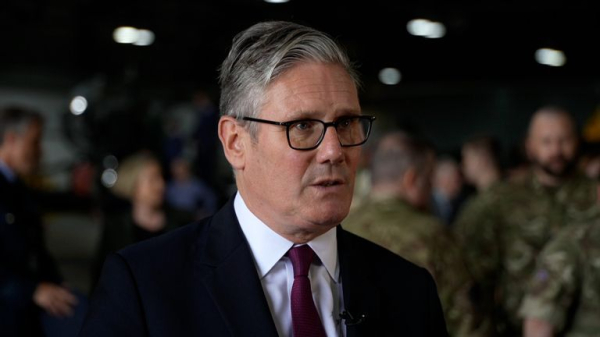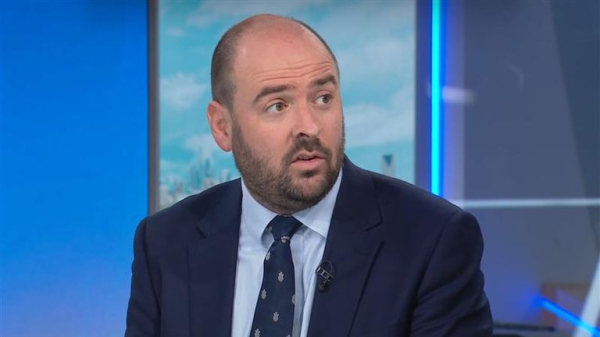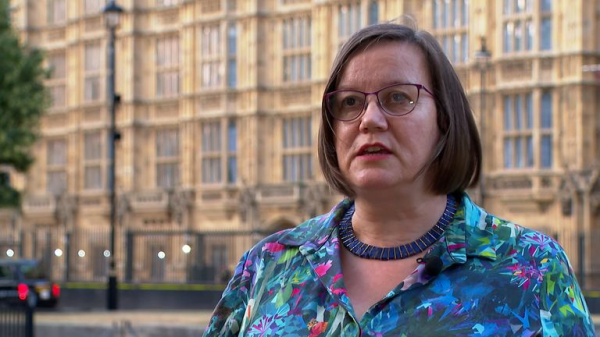Welfare concessions ‘common sense’, says PM – as he defends U-turn

Sir Keir Starmer said changes to his welfare bill “strike the right balance” after making concessions to his backbench MPs.
The prime minister described the U-turn as “common sense” and said it means “we can now get on with the job”.
Politics Live: Starmer defends U-turn
Sir Keir faced a significant rebellion over plans to cut sickness and disability benefits as part of a package he said would shave £5bn off the welfare bill and get more people into work.
Speaking to reporters on Friday, he stood by his position that the welfare system needs reform as “it doesn’t work, and it traps people”.
He added: “We need to get it right. That’s why we’ve been talking to colleagues and having a constructive discussion.
“We’ve now arrived at a package that delivers on the principles with some adjustments, and that’s the right reform, and I’m really pleased now that we’re able to take this forward.
“For me, getting that package adjusted in that way is the right thing to do, it means it’s the right balance, it’s common sense that we can now get on with it.”
The concessions include exempting existing Personal Independence Payment claimants (PIP) from the stricter new criteria, while the universal credit health top-up will only be cut and frozen for new applications.
Analysis: Welfare bill U-turn a humiliating blow for Starmer

More money will also be front-loaded into helping people find jobs, though it is not clear how much beyond the £1bn already announced.
The changes came after 127 Labour MPs signed an amendment calling for the cuts to be delayed and consulted on with disabled people.
Rebels feared the reforms wouldn’t actually help people find work while pushing thousands of disabled people and children into poverty, as per the government’s own impact assessment.
The discontent threatened to derail the Universal Credit and Personal Independence Payment Bill when it comes before the Commons for a vote on Tuesday, on the week that marks a year of Starmer in government.
Asked what he would do about a “hole” in the public finances that the changes are said to leave, Sir Keir said the funding will be set out in the autumn budget “in the usual way”.
The concessions on PIP alone will protect an estimated 370,000 people currently receiving the allowance who were set to lose out following reassessment.
Economists at the Institute for Fiscal Studies and the Resolution Foundation have both suggested that the changes could reduce savings intended in the original package by up to £3bn.
Chancellor Rachel Reeves is also under pressure to find money to pay for the U-turn on cuts to winter fuel, which followed a drubbing at the local elections in May.
Asked about the series of U-turns, Work and Pensions Secretary Liz Kendall earlier said: “Sometimes there’s strength in listening.
“I really believe that to be the case, that you end up in the right position when you talk to all of those with knowledge and experience and actually, if you want decisions to be the right ones and to last for generations to come, I believe that’s how you make the right changes.”
However, she would not guarantee the bill will pass next week.
Some 83 Labour MPs would need to rebel for the government to be defeated.

Last night Dame Meg Hillier, one of the leading rebel voices, hailed the concessions as “massive changes” to protect vulnerable people and involve disabled people in the design of future reforms.
However, not all the rebels have been satisfied with the changes, with several suggesting they would create a “two-tier system”. Sky News is aware of at least 20 MPs who currently intend to still vote against. Many others are undecided.
The concessions came after Downing Street publicly stuck to its guns while engaging in a frantic ring-around to get rebels onside, which further angered MPs.
Many have called for a reset in relations with Downing Street, as the fallout from the rebellion threatens to cause lasting damage.
Conservative leader Kemi Badenoch criticised the U-turn, saying the government’s failure to make “minor savings” on welfare showed they were unable to deal with major issues.

